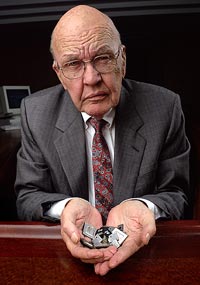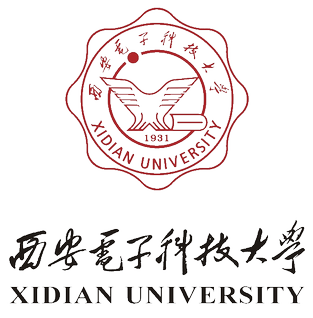Related Research Articles

Electrical engineering is an engineering discipline concerned with the study, design, and application of equipment, devices, and systems which use electricity, electronics, and electromagnetism. It emerged as an identifiable occupation in the latter half of the 19th century after commercialization of the electric telegraph, the telephone, and electrical power generation, distribution, and use.

Jack St. Clair Kilby was an American electrical engineer who took part in the realization of the first integrated circuit while working at Texas Instruments (TI) in 1958. He was awarded the Nobel Prize in Physics on December 10, 2000. Kilby was also the co-inventor of the handheld calculator and the thermal printer, for which he had the patents. He also had patents for seven other inventions.

Mohawk College of Applied Arts and Technology is a public college of applied arts and technology located in Hamilton, Ontario. Established in 1966, the college currently has five main campuses: the Fennell Campus on the Hamilton Mountain, the Marshall School of Skilled Trades and Apprenticeship Campus in Stoney Creek, the Mohawk-McMaster Institute for Applied Health Sciences at McMaster University., the Centre for Aviation Technology Campus and a Mississauga campus at Square One in partnership with triOS a private career college.

Xidian University is a public research university in Xi'an, Shaanxi, China, that is administered by the Ministry of Education of China. Xidian focuses on electronics and information education and research, and has programs covering engineering, computer science, management, economics, liberal arts and social sciences. In 2020, U.S. News & World Report ranked Xidian 8th nationally and 22nd globally for computer science. Xidian is a Chinese state Double First Class University Plan university. It was also funded by Project 211.

Chalmers Jack Mackenzie, was a Canadian civil engineer, chancellor of Carleton University, president of the National Research Council, first president of Atomic Energy of Canada Limited, first president of Atomic Energy Control Board and instrumental in the development of science and engineering education in Canada.
Thomas Kailath is an Indian born American electrical engineer, information theorist, control engineer, entrepreneur and the Hitachi America Professor of Engineering, Emeritus, at Stanford University. Professor Kailath has authored several books, including the well-known book Linear Systems, which ranks as one of the most referenced books in the field of linear systems.

Adel S. Sedra is an Egyptian Canadian electrical engineer and professor.

The McMaster Faculty of Engineering is a faculty located at McMaster University in Hamilton, Ontario. The faculty was established in 1958 and was the first engineering program to developed problem-based learning curriculum. It currently has seven departments in chemical engineering, civil engineering, computing and software, electrical and computer engineering, engineering physics, material science and engineering and mechanical engineering. The faculty offers bachelors, masters, and doctoral degrees.
James Donald Meindl was director of the Joseph M. Pettit Microelectronics Research Center and the Marcus Nanotechnology Research Center and Pettit Chair Professor of Microelectronics at the Georgia Institute of Technology in Atlanta, Georgia. He won the 2006 IEEE Medal of Honor "for pioneering contributions to microelectronics, including low power, biomedical, physical limits and on-chip interconnect networks.”
Haroon Ahmed FREng, is a British Pakistani scientist in specialising the fields of microelectronics and electrical engineering. He is Emeritus Professor of Microelectronics at the Cavendish Laboratory, the Physics Department of the University of Cambridge, Honorary Fellow of Corpus Christi College, Cambridge, and Fellow of the Royal Academy of Engineering.
The IEEE Nikola Tesla Award is a Technical Field Award given annually to an individual or team that has made an outstanding contribution to the generation or utilization of electric power. It is awarded by the Board of Directors of the IEEE. The award is named in honor of Nikola Tesla. This award may be presented to an individual or a team.
Mohamed Jamal Deen is an Indo-Guyanese professor and Senior Canada Research Chair in Information Technology at McMaster University in Hamilton, Ontario, Canada. He is also the Director of the Micro- and Nano-Systems Laboratory. His research specialty are in the broad areas of electrical engineering and applied physics, for which he was recognized in 2019 by an appointment to the Order of Canada.
The IEEE Robert N. Noyce Medal is a science award presented by the IEEE for outstanding contributions to the microelectronics industry. It is given to individuals who have demonstrated contributions in multiple areas including technology development, business development, industry leadership, development of technology policy, and standards development. The medal is named in honour of Robert N. Noyce, the co-founder of Intel Corporation. He was also renowned for his 1959 invention of the integrated circuit. The medal is funded by Intel Corporation and was first awarded in 2000.
Chenming Calvin Hu is a Chinese-American electronic engineer who specializes in microelectronics. He is TSMC Distinguished Professor Emeritus in the electronic engineering and computer science department of the University of California, Berkeley, in the United States. In 2009, the Institute of Electrical and Electronics Engineers described him as a “microelectronics visionary … whose seminal work on metal-oxide semiconductor MOS reliability and device modeling has had enormous impact on the continued scaling of electronic devices”.
James Owen Dineen was a Canadian engineer, university administrator and the twelfth President of the University of New Brunswick.
Henry Clark Bourne Jr. was an electrical engineer, administrator and faculty member at the Georgia Institute of Technology from 1981 until 1993. He was initially recruited by Georgia Tech president Joseph M. Pettit to be Georgia Tech's vice president of academic affairs; Bourne focused on faculty recruitment. Bourne would later serve as Georgia Tech's interim president after Pettit died of cancer in 1986.
Angel G. Jordan was a Spanish-born American electronics and computer engineer known as the founder of the Software Engineering Institute (SEI) and co-founder of the Robotics Institute at Carnegie Mellon University (CMU) and served on its faculty for 55 years, since 2003 as Emeritus. He was instrumental in the formation of the School of Computer Science (SCS) at Carnegie Mellon. He has made contributions to technology transfer and institutional development. He served as Dean of Carnegie Mellon College of Engineering and later as the provost of Carnegie Mellon University.

The College of Engineering is a faculty at the University of Saskatchewan in Saskatoon, Saskatchewan, Canada.
H.-S. Philip Wong is the Willard R. and Inez Kerr Bell professor in the School of Engineering, Professor of Electrical Engineering at Stanford University. He is a Chinese-American electrical engineer whose career centers on nanotechnology, microelectronics, and semiconductor technology.
References
- ↑ "Barber, Douglas". HPL. Retrieved 2021-03-26.
- ↑ Dobby, Christine (24 January 2012). "Semtech to buy Canadian chip maker Gennum for $500M". Financial Post. Retrieved 2021-03-26.
- 1 2 "Douglas Barber". Professional Engineers Ontario. Retrieved 2021-03-26.
- ↑ "H. Douglas Barber". National Research Council Canada. April 1, 2009. Retrieved March 9, 2017.
- ↑ Order of Canada citation
- ↑ Fragomeni, Carmela (2007-02-10). "Order of Canada for Barber, Pelech". The Hamilton Spectator.
- ↑ "Hamilton couple gives the gift of a college education to an entire North Hamilton neighbourhood". Mohawk News Desk. October 2, 2015. Retrieved May 18, 2017.